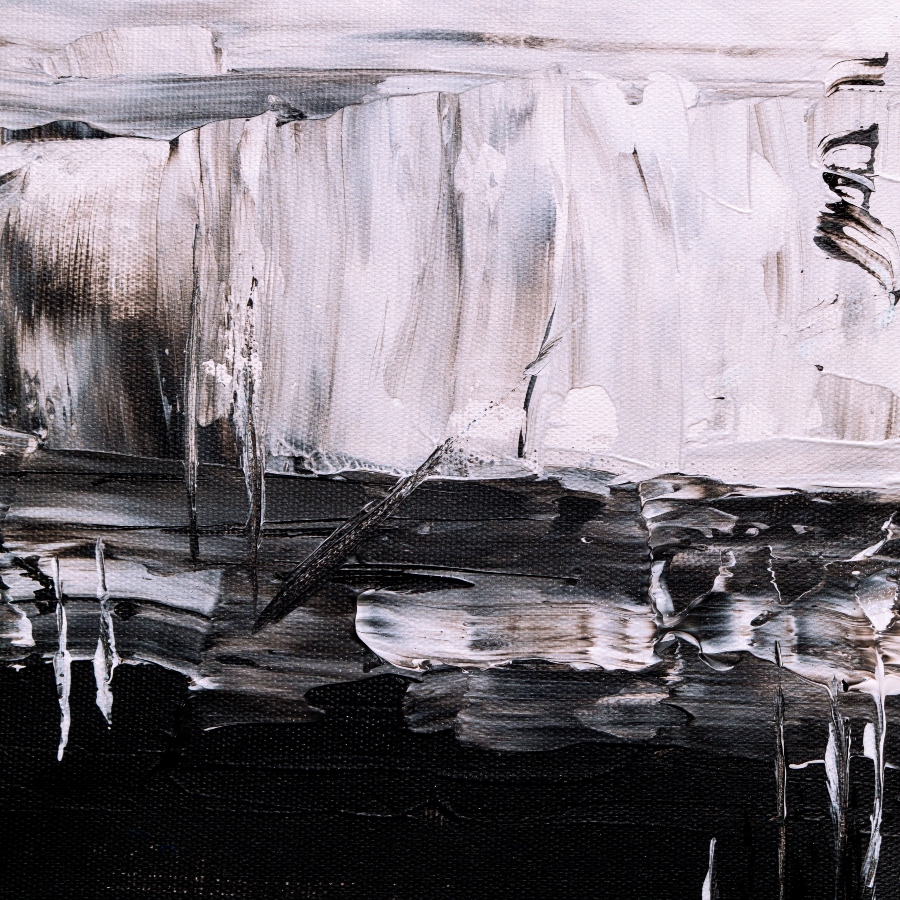All winter, Grandpa seems frailer, like he’s entering a final phase. His living room’s cluttered, he hasn’t shaved, and we wonder if he’s remembering to brush his teeth. When he says goodbye, watching us put on our boots, his blue eyes blur, jelly candies softening with sadness.
By April, the snow’s melted. Grandpa dances shirtless on the yellow grass, wispy white belly hair shaved to a silvery stubble. The music booming from the garage is Stravinsky; Grandpa’s technique—the hips, the hands, the deep pliés—classic Balanchine. “See?” Mom says to us, shaking her head. Us: his grandchildren, Millicent, Marcus, Mathilda. “Now, what kind of sign is this?”
Grandpa’s first painted works, in late April, are oil on unstretched canvas, thick crusty mustards, slashes of grainy burgundy—whirlpools, lightning strikes, recalling the athleticism of the Balanchine. One last time he makes us coconut pancakes, Grandma’s specialty, with walnuts and bananas, nutmeg, and allspice. “I won’t have much time for cooking anymore,” he tells us, silk scarf wrapped around his head, dried burgundy splashes on his collar. We thank him, try to remember what we know of abstraction, instinctive utterance, models not drawn from the observable world.
*
As far as we know, Grandpa’s only career was forklift operator at Dubey’s Lumberyard. If Grandma were still with us, she’d have more information. Mom only remembers he came home exhausted, sawdust clinging to his flannel shirt. They rarely vacationed, went no further than ten miles up the road to the Chichester Fair.
After a visit to Grandpa’s now, Mom brews coffee, wrinkles her brow, sighs, clucks—her full repertoire of worried mother-daughter tics. “I never saw it coming,” she says. “Who could have seen this coming?”
When Grandma passed, Grandpa didn’t speak for days, maybe weeks. It’s foggy in our minds: we were teenagers, drinking, getting high, we had our own issues to deal with. When Mom rounded us up to visit him, we told her, “But he doesn’t want company,” which seemed true: at his house, he glowered at us, never said hello.
Now we’re in our twenties and don’t need convincing—we’re eager to see his new work. “Going over again?” Mom asks us. She’s impressed, maybe, but a little annoyed. In May and June, he’s often working outside. He smiles when he sees us, turns back to a spidery mobile of bicycle tire spokes and fishing gear; a cloudlike creation—dryer lint, goose down, milkweed fluff—a fog of grays and dirty whites. But we try not to visit too often, we don’t want to scare him away.
*
We’re never introduced, but we call him Anton. The angular man with a mustache like spider plant leaves, a bemused expression when we watch him paint Grandpa’s garage a bruised purple. Grandpa’s lithe, silver-haired occasional dance partner, whose limber frame we try not to imagine bending into arcane sexual positions, we call Eva.
“Your grandfather is still quite ill,” Anton says, one June morning when Grandpa’s busy at the piano, improvising around a melody of Bartók’s. “But he’s energized,” Eva adds. They touch hands, shimmer-like images in rippled water, refractions of light.
“He doesn’t talk to me anymore,” Mom says. “And I don’t think I like his friends.” She blows her bangs out of her eyes. “Sweet Jesus, I need to dye this mess; my roots are three inches long.”
We touch her shoulder, try to reassure her. He’s shy when we grandkids visit, too, often only says to us, “This is what I’ve been working on.” He prints the titles with a label maker. Millicent thinks she sees Grandma’s nose in the cubist dimensions of June 22: Untitled; Marcus a scrap of her turquoise scarf in the assemblage of cloth, bone, and fur titled June 29: Work in Progress.
*
Our memories are mottled. Grandma was tiny, her hair bobby-pinned in a silver bun; she played records, swiveled her hips when she folded the wash. Grandpa worked in the garage, painted wooden cartoon figures he staked into the lawn. We don’t remember if they held hands or kissed good morning, embraced each other at the end of the day. We wonder if we missed the hints: a stash of canvases in a basement corner, a hash pipe in a bureau drawer; a cable from Anton congratulating them on their first grandchild, Eva’s card of condolence after Grandma died. Mathilda imagines an East Village studio, gin bottles, fistfights in alleyways; Millicent sees Grandma with an orchid in her hair, streetlight amber glow, glass of absinthe, a sidewalk café in Hemingway’s Paris.
At the Chichester Fair, Grandpa and Grandma led Mom through the midway, tossed rings, rang bells, won dolls and stuffed bears, and ate fried dough, sausage with peppers and onions. Mom was afraid, but Grandma and Grandpa took her hand: their faces filled with light when they stopped at the top of the Ferris wheel. They could see everything from there, the sky a smear of sunset orange.
In mid-summer, Grandpa papers his living room with black and white photos of Beechwood Cemetery, Grandma’s grave spooky with shreds of fog. The heat’s plainly getting to him—flushed, blotchy cheeks, gray, damp forehead. He’s lost another several pounds. But when he shows us his work, his eyes are alight.
“Eventually we’ll have to make a decision,” Mom says. It’s July, dangerously warm; we’re looking at his grandest installation, a scrap metal rollercoaster erected behind the garage, Grandpa at the controls in a cut-off flannel shirt. “Maybe put him somewhere comfortable. Someone at least needs to make a diagnosis.” But what is there to diagnose, and who would dare diagnose it? This late-period romp through cubism, abstraction, and expressionism, a last heartrending turn toward realism; the absurd grandeur of Grandpa’s latest work, Eva and Anton’s elated faces as their car surges over the top, hints of absinthe and cotton candy clinging to its rollercoasty curves.

